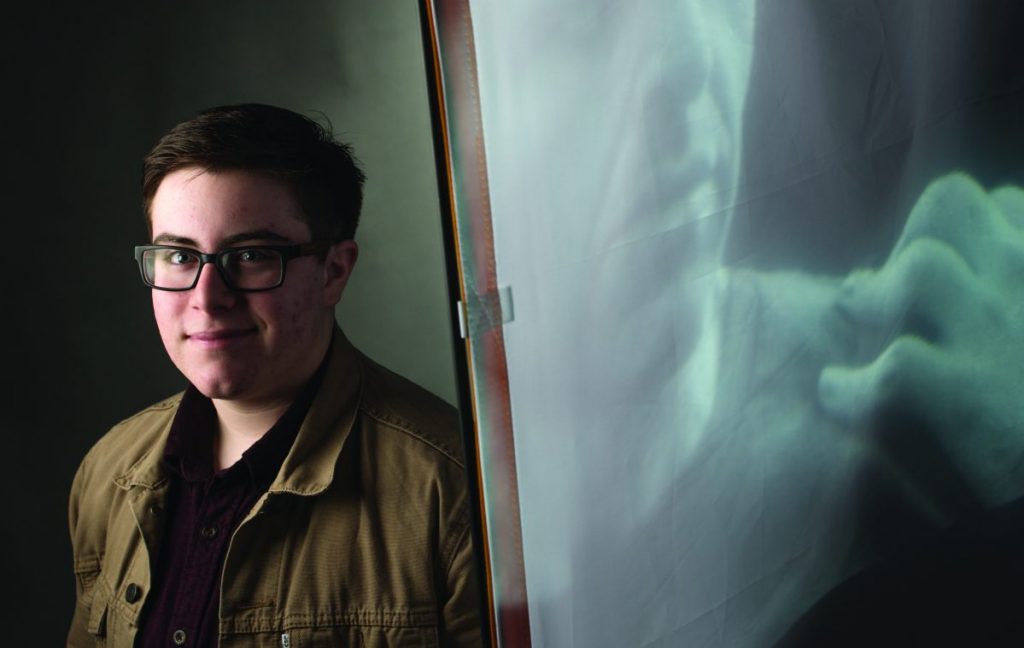
Photo by Ben Siegel
Transgender student Patrick Local answers more questions about his transition, being a film major at OHIO, and other topics.
Talk about your longtime girlfriend.
I began dating her about a month into my freshman year of college. She knew I was transgender, but I still presented as female, so we had some difficulty adjusting as I began to transition. She primarily dated women before me, so I think the most difficult aspect for her was a loss of visibility—meaning that now others saw her as someone in a heterosexual relationship rather than as a queer woman. She’s been extremely supportive all along, though.
You’ve always been attracted to women.
The only thing that changed is the label based on my gender: heterosexual now, rather than lesbian, a term I never liked because of its gendered nature.
When do you share that you’re transgender? Has your impetus remained the same as time goes by?
This is something that is constantly evolving for me. In the beginning, I was very embarrassed about being transgender, and I didn’t want anyone to know. The issue with that, though, is that as someone who didn’t pass as male, there was no way for me to hide it. At that time, the only way for me to experience life as a male was to come out constantly to people. Now that’s changed, and people don’t always know right away, but I make a point to talk about it if it comes up because I don’t want to be ashamed.
Natasha Maidoff, one of your OHIO film professors, summarized your filmmaking this way: “He is using the complexity of the human psyche and finding ways to visualize how it manifests itself.”
I’m interested in the relationship between the mind and the body. I always have been, particularly because of my situation. For me, filmmaking is an extension of myself. It’s very difficult for me to separate my own interests and experiences form the stories I’m trying to tell. That may change with the maturity of my work, or it may be a part of who I am as a filmmaker. I also have an interest in mental illness because I’ve had some people close to me who struggled with depression and anxiety, and I think it’s a situation that makes apparent the connections between body and mind.
You’re ambivalent about having been valedictorian at Waverly (Ohio) High School.
I don’t enjoy thinking about my graduation. It was before I had any men’s dress clothes, and I had to wear a dress when giving a speech in front of a large audience. I was so self-conscious and uncomfortable that I refused to take the graduation gown off for pictures. I was proud that day but also embarrassed.
Do you consider yourself a role model for transgender youth?
Yes and no. I’m not sure I’ve accomplished anything exceptional enough to be considered a role model. In some ways, though, I am because there is so little representation, and, it seems, so few of us, that I think we do look to one another for inspiration. At least, that’s my experience.
Transgender: some terms and definitions
- Sex: classification of people as male, female, or intersex
- Gender: social phenomena associated with being male, female, both, or neither
- Sexual orientation: someone’s enduring physical, romantic, and/or emotional attraction to another
- Gender identity: one’s internal sense of gender; for transgender people, it does not match the sex they were assigned at birth
- Gender expression: external manifestations of gender via name, pronouns, clothing, haircut, voice, deportment, etc.
- Transgender: people whose gender identity and/or gender expression differs from what is typically associated with the sex they were assigned at birth
- Transition: the process of affirming one’s gender identity
- Gender dysphoria: negative or conflicted feelings caused by the discrepancy between one’s sex assigned at birth and one’s desire for the body and role of the other sex
- Gender role: behaviors, traits, thoughts, and dress expected by members of a particular sex as dictated by culture/context


